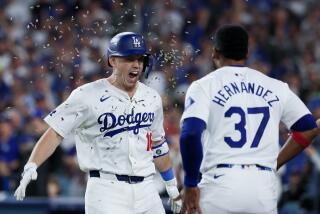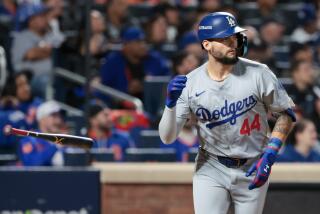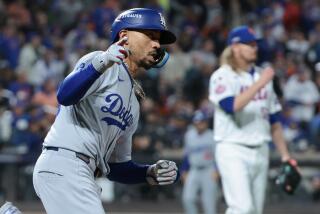BASEBALL PLAYOFFS : Tudor’s Time Has Arrived; Ojeda’s May Not Come Again : Met Pitcher’s Luck Finally Ran Out, but He Proves to Be Tough as Ever
He always felt like the tough one, the lucky one.
Once, when he was 13, New York Mets pitcher Bob Ojeda was turning his minibike around in the middle of a wilderness bridge that spanned a dry creekbed in Northern California. He had been doing it the same way for months--speeding to the end of the bridge, spinning around, and speeding back home.
Only this time, when he was halfway through his turn, the bike’s throttle stuck.
The bike flew over the edge, and down went Ojeda and the bike. Twenty feet down and who-knows how many feet out, they bounced off a brick wall. Ten feet farther down, they landed in the dirt.
Amazing story No. 1 is that he wasn’t seriously hurt. A few bruised ribs, some soreness.
Amazing story No. 2 is what happened on his way home. Ojeda picked himself up and began limping the 2 miles back to his house. A mile later, he was spotted by a woman and two teen-age girls in a car. Seeing his bloody and torn clothing, they pulled over and asked if he was OK.
He took one look at the girls and refused to answer.
“I knew that if I opened my mouth, I would start crying, and no way was I going to let any girls see me cry.” Ojeda said. “So I just shook my head, like everything was fine.”
As it turned out, everything was fine. That’s the way it works when you feel lucky, and tough. You always get up. You always find your way home.
Bob Ojeda appreciates that now, 17 years later, because things are different now.
“Way different,” Ojeda said earlier this week, sitting in the visitors’ dugout at Dodger Stadium, uniformed as any other New York Met with one exception. You couldn’t see any portion of his left pitching hand but his thumb. The hand was wrapped in white plaster, and Ojeda was elevating it at all times, as if he were practicing an oath of office.
On Sept. 21, a day before the Mets clinched the National League East title, their No. 4 starter, Ojeda, nearly severed the end of the middle finger on his pitching hand. And it didn’t happen on a minibike in the woods.
It happened in the suburbs. In the side yard of Ojeda’s Port Washington, N.Y., home. With an electric hedge trimmer.
“Can you believe that?” asked Ojeda. “I fall off bridges and walk away. I’ve been in car wrecks and walked away. And what gets me? Hedge clippers.”
On a clear fall morning, just as he began grooming some bushes, the trimmer bounced off a tough limb. His left hand, guiding the tool, slipped into the blade. His nearly hysterical fiancee rushed him to the hospital, where he underwent 5 hours of micro-surgery.
The fingertip has been saved. The same cannot be said, for certain, about his career.
Ojeda may not begin throwing hard again until next spring. Doctors say they cannot comment on his comeback chances until then.
“We won’t know what he can do until he faces a batter,” said club physician James Parkes.
In the meantime, Ojeda, who had a 10-13 record and a 2.88 earned-run average, will be replaced in the postseason rotation by Sid Fernandez, the No. 5 starter who has a 12-10 record and a 3.03 ERA. And Ojeda said that no matter what happens, he’s learned something.
He learned about living with being unlucky. And, a day after the accident, he learned that it’s OK if you’re always not so tough.
The Mets clinched the title with a 3-1 win over Philadelphia. Ojeda was watching the postgame celebration on television from his hospital bed. Between gulps of champagne, his teammates were wishing him the best, talking about how it was no fun without him.
For the first time since the accident, Ojeda broke down.
“To hear all these people talking about you, saying what you mean to them . . . I got so emotional, I couldn’t keep it on the same channel. I couldn’t take it. And I will never forget it.”
Ojeda smiled. “Put it this way. Going through this accident was like watching your own funeral. I saw things in a way I’ve never seen them before. I’m never going to be the same person.”
Ojeda may not consciously have tried to push the incident out of his mind, but when he was asked what day it had happened, he couldn’t remember.
“Seriously, I don’t recall the date,” he said. “I think it might have been a Wednesday, but I don’t know. I decided, I can’t bring it all back, or it will drive me crazy.”
This much he remembers: He had just started clipping the hedges. He hit a limb. His hand slipped.
At the time, Ojeda had started 29 games for the Mets, a minor miracle considering that he missed most of last season because of an operation on the ulnar nerve in his left elbow. He had the second-lowest earned-run average on the Met staff, another minor miracle considering that the staff includes Dwight Gooden, David Cone and Ron Darling.
He arrived at the hospital, where he said doctors were contemplating amputation. Ojeda demanded that they contact Parkes.
A phone call later, Ojeda was transferred to another hospital to meet with Parkes and hand specialist Richard Eaton. By then, the pitcher was dazed, but there was something they had to ask him.
“They wanted to know at what angle did I want my finger reattached,” Ojeda said. “Of course, I told them, straight. They said no chance. They said it is usually done at a 30-degree angle. I told them, no, do it at a 10% angle so at least I still have a chance to pitch again.”
So they did. The middle finger being crucial to a pitcher, it is still unknown how much a forever-bent finger will affect him.
“They said it’s up to me,” Ojeda said. “Basically, how much pain can I take and how bad do I want it.”
After the operation, Ojeda wasn’t the only one in shock.
“None of us could believe what had happened,” said Rick Aguilera, another Met pitcher and close friend who met Ojeda in the hospital emergency room. “When I saw him, he didn’t want to believe it. And back at the ballpark, none of the guys on the team wanted to believe it. We all just walked around, not knowing what to do.”
Ballplayers being ballplayers, the shock wore off and the Mets showed up at Ojeda’s hospital room with smiles and jokes.
“Nice guys,” Ojeda said. “A couple asked me if I was going to throw a split-fingered fastball. They also wondered if doctors could remove the rest of my fingertips and I could become a knuckleball pitcher.”
Now, Ojeda laughs with them. The cast will come off in a couple of weeks. He will try to hold and throw a baseball in November. He is feeling lucky and tough again.
More to Read
Go beyond the scoreboard
Get the latest on L.A.'s teams in the daily Sports Report newsletter.
You may occasionally receive promotional content from the Los Angeles Times.











